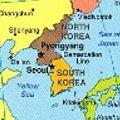More than 90 South Koreans passed through checkpoints Saturday to cross the heavily armed border between North and South Korea, on their way to bittersweet reunions half a century in the making.
Buses transported the elderly South Koreans to North Korea's Kumgang Mountain resort, where they got the chance to see family members they left behind in the early 1950s. South Korean broadcasters have begun relaying images of the families exchanging their first words in decades, along with laughter and tears.
North Korea invaded South Korea in 1950, unleashing three years of war. Many Koreans fled to the South, leaving wives, husbands, sons, and daughters behind.
The fighting was halted by a 1953 armistice but with no peace treaty, the two Koreas remain technically at war, amid decades of isolation and hostility.
The reunions getting underway are the 17th in a series organized by the Red Cross. They began after a historic 2000 inter-Korean summit thawed relations between the two sides. They have been on hold for two years amid tensions over North Korea's nuclear weapons development. Shin Gwang-sun is 92. He is reuniting this weekend with his daughter.
He says when he left his family behind, his youngest daughter was just a few months old. She will not recognize his face, he says, and she has never seen a photo, either.
Shin is one of a lucky few winners of a selection process for these reunions that involves both a random lottery and a screening based on age and family history.
Tens of thousands of other Koreans are on waiting lists, hoping for a similar chance.
Shin says when he got the call from the Red Cross, he was so happy, he wondered if he was dreaming. He says he never dared imagine he could see his daughter alive, and hear about his hometown. He considers himself very lucky.
Included in the swell of emotion at these events are, for some, pain and frustration. That is because out of three days and two nights, the families will only see each other for a total of about 11 hours. North Korea holds the events in banquet halls with no real opportunity for privacy, and forbids the families from spending the night together.
Many of the reunion participants also realize that when the buses leave Mount Kumgang, it will be the beginning of another period of separation, likely to last the rest of their lives.
Kurt Achin, VOA News, Seoul

